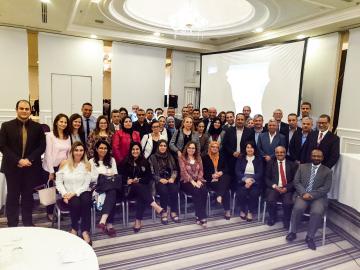
Beirut-Tunis, 30 October 2019 (ESCWA)--As part of efforts to improve planning processes towards the achievement of the Sustainable Development Goals (SDGs) by 2030 in the Arab region, ESCWA concluded today a two-day workshop on “Enhancing integrated national development planning in Tunisia”. The workshop was aimed at building the capacity of Tunisian planning stakeholders in the different techniques and methodologies of integrated planning.
In his opening remarks, Director of the Economic Development and Integration Division at ESCWA Moctar Mohamed El Hacene said that the workshop would offer a platform for participants to share experiences, lessons learned and best practices in development planning, including with representatives from other Arab countries.
Indeed, Director General of the Economic Research Department at the Saudi Ministry of Economy and Planning Majid El Ayed shared the experience of Saudi Arabia in developing its national development strategy in the framework of the 2030 Agenda, Saudi Vision 2030, including devising a governance model and strategic goals.
Presenting on the status of national planning in Tunisia and the key successes and challenges, Economic Affairs Officer at ESCWA Nathalie Khaled urged to aim for realistic targets, establish social dialogue and use reliable data.
Belgacem Ayed, Chairman of the General Authority for Sectoral and Regional Development at the Ministry of Development, Investment and International Cooperation in Tunisia, discussed the main gaps, barriers and opportunities for improvement in the process of national development planning in his country.
Representatives of ministries of planning, economy, industry, trade, education and health, housing, and all entities directly or indirectly engaged in the process of development planning reflected in working groups on the development-planning status quo, identified key actions to improve it and substantive levers and influencers to improve the effectiveness of future planning process.
For more information:
-Ms Rania Harb, Public Information Assistant, +961-70-008-879; email: harb1@un.org





